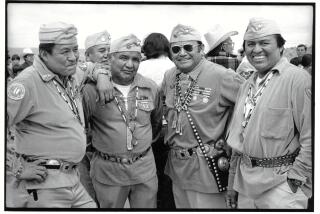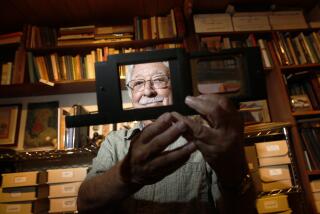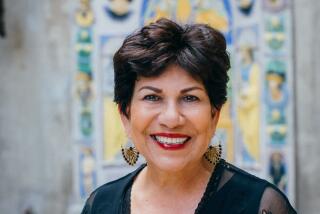Katherine Siva Saubel, preserver of Cahuilla culture, dies at 91
Katherine Siva Saubel, an elder of the Cahuilla Indian tribe of Southern California, once described herself as “just a voice in the wilderness all by myself.” She meant that she had few people with whom she could speak the Cahuilla language or sing the songs that conveyed her people’s ancient stories.
“My race,” she told The Times in 2000, “is dying.”
Now Saubel, long its feistiest guardian, has died.
“It’s a huge loss … the end of an era,” said Nathalie Colin, an ethno-historian at the Malki Museum near Banning, which Saubel co-founded more than 45 years ago to preserve Cahuilla history and traditions.
Saubel, 91, died of natural causes Tuesday at her home on the Morongo Reservation near Banning, said her nephew, Kevin Siva.
One of the last fluent speakers of the Cahuilla language, Saubel worked with linguists and anthropologists to produce a Cahuilla dictionary and grammar book as well as historical accounts and studies of medicinal plants known through tribal lore. In 1964, she helped launch the Malki Museum, the first nonprofit museum founded and managed by Native Americans on a reservation.
She was also an activist, who in 1998 brought electricity to the Los Coyotes Reservation in San Diego County, where she was born and later served as tribal chairwoman.
“Dr. Saubel was truly remarkable, both as a leader and as a fierce defender of Native American culture, from the preservation of the traditional Cahuilla language to the protection of sacred sites,” Robert Martin, chairman of the Morongo Band of Mission Indians, said in a statement last week.
The Cahuilla (pronounced ka-wee-yah), once one of the largest California Indian tribes, are concentrated in Riverside and San Diego counties. Among the more prominent Cahuilla bands are the Morongo and the Agua Caliente band in Palm Springs.
Born on March 7, 1920, Saubel was the eighth of 11 children. She lived on the remote Los Coyotes Reservation until she was almost 4 and then moved with her family to Palm Springs.
She entered public school there at 7, knowing not one word of English. Some Indian children were beaten when they were caught speaking their native language in school; Saubel was just ignored. “I would speak to them in the Indian language,” she told The Times in 2000, “and they would answer me in English. I don’t remember when I began to understand what was being said to me. Maybe a year.”
She was believed to be the first Native American woman to graduate from Palm Springs High School, in 1940. That year she married another Cahuilla Indian, Mariano Saubel.
She is survived by their son, Allen; four grandchildren; two great-grandchildren; and two great-great-grandchildren.
Her funeral will be held at 10 a.m. Tuesday at St. Mary’s Catholic Church, 11205 Mission Road, Banning.
Despite strong pressures to abandon her language and culture, Saubel worked on her own to maintain her ability to speak Cahuilla. She memorized sacred songs that traditionally were performed only by Cahuilla men. She also learned about native plants and their uses from her mother, a medicine woman, and recorded the information in a journal.
But the post-World War II years brought unsettling changes.
“Everything started happening after the 1940s,” she told the Press-Enterprise of Riverside in 2003. “We lost our language, and members started marrying outside our culture.”
In 1958, she met Lowell Bean, a UCLA graduate student in ethnology and anthropology, who was sent by one of his professors to find out whether there was any viable Indian culture left in California. He found the proof in Saubel and her extended family.
“She was an academic treasure,” Bean, who collaborated with Saubel on a number of major studies, said Friday. “She was the dominant interpreter of Cahuilla culture and history.”
Saubel went on to work with other prominent linguists and anthropologists and lecture on Cahuilla culture at universities in the U.S., Japan and Germany. She co-wrote a Cahuilla dictionary with Jans Jacob Seiler and a Cahuilla grammar book with Pam Munroe. With Bean, she produced “Temalpakh: Cahuilla Indian Knowledge and Usage of Plants.”
She also wrote a memoir, “A Dried Coyote’s Tail,” with Eric Elliott.
The Malki Museum was the brainchild of her close friend Jane K. Penn, a descendant of a Cahuilla chief. Penn asked Saubel to become president of the museum, a post she held from 1965 until her death.
In recognition of her efforts to perpetuate Cahuilla culture, Saubel was inducted into the National Women’s Hall of Fame in Seneca Falls, N.Y., in 1993. In 2002 she received the Chancellor’s Medal from UC Riverside and an honorary doctorate from La Sierra University in Riverside.
When her husband died in 1985, Saubel lamented that there was no one left to speak Cahuilla with her. “When you lose your language,” she said often, “you lose everything. You can’t interpret your songs, your stories — it’s gone.”
About six years ago, she began teaching traditional songs for the dead to a small group of young Cahuilla men, including her grandson, Aaron Saubel. He said they have never performed the songs without her, but plan to honor her by singing at her service. They will include one of her favorites:
Catch me
Catch me
I’m shaky
I’m falling
Using the power
of the stars
and the ocean
Help me
I’m falling
Catch me
More to Read
Start your day right
Sign up for Essential California for the L.A. Times biggest news, features and recommendations in your inbox six days a week.
You may occasionally receive promotional content from the Los Angeles Times.





















































